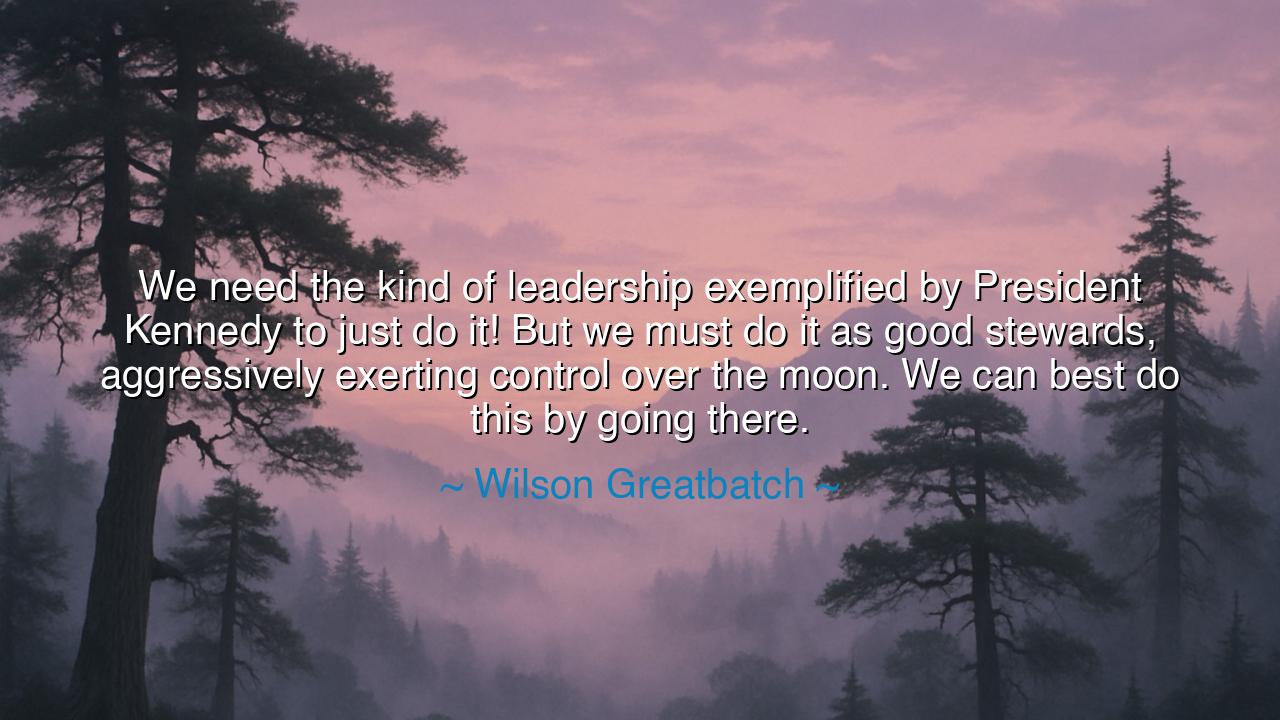
We need the kind of leadership exemplified by President Kennedy
We need the kind of leadership exemplified by President Kennedy to just do it! But we must do it as good stewards, aggressively exerting control over the moon. We can best do this by going there.






In the words of Wilson Greatbatch, the inventor and visionary who helped create the implantable pacemaker, we hear the echo of a grand human calling — the call to leadership, boldness, and stewardship over the unknown. When he said, “We need the kind of leadership exemplified by President Kennedy to just do it! But we must do it as good stewards, aggressively exerting control over the moon. We can best do this by going there,” he was not merely speaking of rockets and craters, but of the spirit of exploration that defines civilization itself. His words are both a challenge and a remembrance: a call to act with courage, and a warning to act with wisdom.
When President Kennedy declared, “We choose to go to the Moon,” he kindled a fire that transcended science — a fire of faith in human potential. It was not the Moon alone that humanity reached for; it was its own reflection in the heavens. Greatbatch invokes that same flame, reminding us that the act of “going there” — of striving for what seems unreachable — is what awakens the sleeping soul of mankind. Yet he adds a layer of moral depth that Kennedy’s era could only begin to glimpse: the need for good stewardship. For every conquest of nature must be balanced by reverence, every step into the cosmos guided not by greed or pride, but by responsibility to the world we represent.
In the ancient traditions, the act of reaching beyond the known world was always seen as sacred. The Greeks told of Prometheus, who brought fire to humanity at great cost. The Chinese spoke of Chang’e, who ascended to the Moon, carrying both hope and sorrow. Greatbatch’s words unite those myths with modern science — for he sees the same eternal impulse at work: the quest for knowledge, tempered by the duty of the wise. The Moon, in this sense, is not a prize to be claimed but a mirror that reveals who we are — whether we ascend as conquerors or as caretakers.
Consider the story of Greatbatch himself. While building a heart-recording device in 1956, he accidentally inserted the wrong resistor into a circuit — and in that mistake, he discovered the rhythm that would lead to the invention of the pacemaker. His error became revelation, his curiosity salvation for millions. In that moment, Greatbatch lived his own philosophy: to “just do it”, to press forward into the unknown, not recklessly, but with purpose and humility. His invention did not merely conquer death — it taught humanity how to listen to life’s most fragile sound: the heartbeat. And in this, he embodied the same spirit he demanded for our journey to the Moon.
His phrase “aggressively exerting control over the moon” is not the domination of power but the discipline of mastery. The ancients knew that mastery begins within. Before a warrior could rule the battlefield, he had to rule his own heart; before a king could command the land, he had to conquer his own pride. So too, before humanity reaches for the stars, it must learn to govern its own ambitions. The Moon should not be exploited, but understood; not possessed, but partnered with — for the cosmos is not an empire to seize, but a temple to explore.
The meaning of Greatbatch’s quote, then, is both technological and spiritual. He calls for leadership — the kind that dares greatly, that refuses timidity. But he also calls for guardianship — the wisdom to use power with restraint. True progress, he reminds us, is not measured by distance traveled, but by the integrity with which we travel it. A civilization that reaches the Moon without mastering its own heart is not ascending — it is only drifting higher in folly.
The lesson for us, children of this restless Earth, is clear: be both explorers and stewards. Let your courage be fierce, but let your conscience be fierce as well. Whether your “Moon” is a dream, a discovery, or a destiny, go there — but go with reverence. As Greatbatch teaches, the journey is not simply about conquering a new frontier, but about becoming worthy of the frontier we conquer. For only when we learn to blend the boldness of Kennedy with the humility of the wise do we earn the right to touch the stars.
So, let us rise, as they once did, with the fire of vision and the calm of understanding. Let us build, not only with steel and science, but with faith, stewardship, and awe. And when we look upon the Moon — pale, patient, waiting — may we remember that our greatest duty is not to control it, but to rise to meet it in the full light of our humanity.






AAdministratorAdministrator
Welcome, honored guests. Please leave a comment, we will respond soon